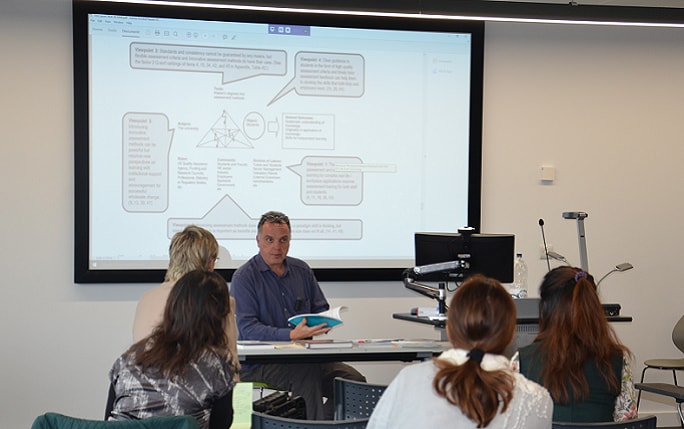Community of Q researchers host a workshop at the Management School

The University of Liverpool Management School recently hosted a research event around Q Methodology with prestigious researchers in the field in attendance.
The School welcomed current and past Presidents of the European Society for the History of the Human Sciences, of the International Society for the Scientific Study of Subjectivity (ISSSS) who were able to share their publication insights into the use of Q methodology. Q methodology is used to investigate the perspectives of participants who represent different stances on an issue, by placing participants in ranking order of agreement. The event was organised by Dr Denise Preece of the Management School.
Editors and reviewers to the ISSSS journal also ran a Q and A session. The event included a free Q software demo with experts discussing their thoughts on the use of the methodology, its application in research practice and the free software available as well as Editors and reviewers.
James Good, journal editor and reviewer, discussed issues that commonly arise concerning how much detail to provide around method and analysis with specific reference to Q methodological manuscripts. James is Honorary Fellow (formerly Senior Lecturer) in the Department of Psychology at Durham University and is a past President of the European Society for the History of the Human Sciences, of the International Society for the Scientific Study of Subjectivity (ISSSS).
Dr Stephen Jeffares, Lecturer in Public Policy at the School of Government and Society at the University of Birmingham, delivered a session which covered aspects of data collection. His current research questions in what ways digital technology is reshaping relationships between public servants and citizens. For over a decade Stephen has applied Q-methodology to map the viewpoints of policy actors.
Tim Deignan, independent consultant and author, spoke of having Q studies published and discussed the process including understanding and negotiating the expectations of editors and reviewers. The session involved an open discussion with the audience around their own personal experiences. Tim’s clients have included universities, colleges, trusts and non-governmental organisations. Tim's work typically involves modelling different values and perspectives on complex issues in order to improve policy and practice.